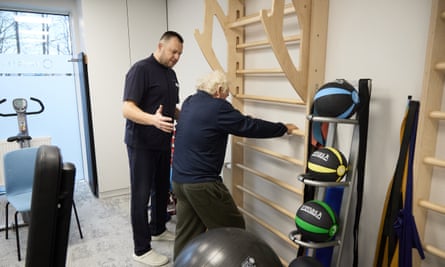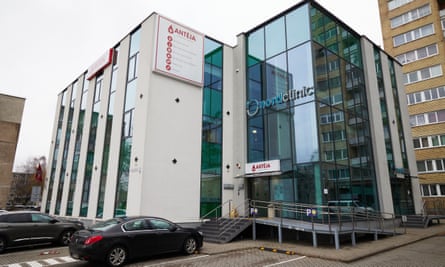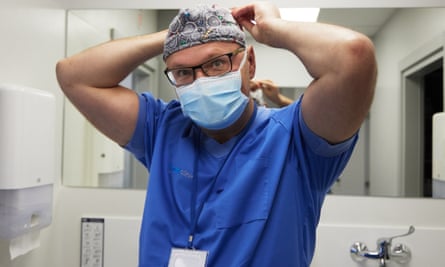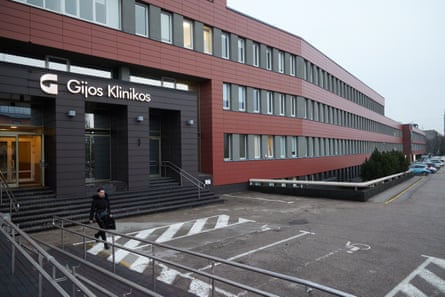Cathy Rice had been in all-consuming pain for 18 months when she decided to fly to Lithuania. “I was going up the stairs on my hands and knees. I couldn’t get to the shop. I had no quality of life,” she says.
Rice, 68, who has four grandchildren, had been told she needed a knee replacement for an injury caused by osteoarthritis but – like millions of NHS patients – faced a gruelling wait.
At a clinic in Kaunas, Lithuania’s second largest city, the operation was arranged within weeks and cost €6,800 (£5,967) – around half the cost in the UK. The price included a pre-travel consultation, return flights, airport transfers, two nights in an en suite hospital room, pre-surgery check-ups and post operative physio.
“I thought, ‘Just look at your choices. You can stay here and be in this kind of pain for another couple of years or you can take a decision’,” Rice says.
The former health sector worker, from Glasgow, is one of a growing number of Britons going abroad for routine medical care. She had never gone private before and never had a desire to. But last week, a year after the first surgery, she returned to Lithuania to have the same procedure on her other knee. This time, she says the wait she faced on the NHS was three years.
She explains tearfully that to cover the costs of the surgeries in Lithuania, she sold her house. “People think that if you’re doing this you’ve got a wonderful pension or you’re very well off. But the driver here is that people are in pain,” she says. “This is not medical tourism; it’s medical desperation.”
In the basement gym of the same hospital in Kaunas – a gleaming white clinic overlooked by Soviet-era apartment buildings – another patient, William Grover, 79, is stepping on and off an aerobic block.

The grandfather of eight, from Portsmouth, is two days post-surgery following a right hip replacement that cost €7,000 (£6,146). The former construction worker decided to fly the two and a half hours from Luton to Lithuania to have the procedure at the Nordorthopaedics clinic after facing an uncertain wait on the NHS. He had been quoted £15,000 by a private hospital in the UK.
“I always used the NHS. I never thought I would need to go private. But my hip was getting worse and worse and I got to the stage where I was just thinking, ‘What am I going to do?’” he says.
Battered by the pandemic, workforce shortages and a chronic lack of social care capacity, the UK’s health systems are under acute strain. The latest NHS figures show that 7.19 million people were waiting for treatment in England alone in November, with 406,575 waiting over a year. There were more than 600,000 patients waiting in Scotland for planned procedures at the end of last September and there were more than 750,000 waiting to start treatment in Wales in October.
A Department of Health and Social Care spokesperson said it was “working tirelessly” to ensure people get the care they need and that the NHS had “virtually eliminated waits of more than two years for treatment”.
The Welsh government said it had “ambitious targets” to tackle delays for planned care while the Scottish government said it was opening four national treatment centres that could provide capacity for over “12,250 additional procedures, dependent on workforce”.
But a growing number of people are resorting to going private. Google trends data shows UK searches for “private healthcare” are at a record high while figures from the Private Healthcare Information Network show the number self-paying for private acute care has increased by more than a third compared with before the pandemic, with a 193{2c3a8711102f73ee058d83c6a8025dc7f37722aad075054eaafcf582b93871a0} rise in those paying for hip replacements.
For those who cannot afford private care in Britain, travelling abroad can be appealing. In some countries in Europe, operations can be as little as half the price of the equivalent treatment in the UK, even after factoring in extras like post-operative rehabilitation.

There is no reliable source of data on outbound UK medical tourism, but the Office for National Statistics (ONS) has estimated that about 248,000 UK residents went abroad for medical treatment in 2019, compared with 120,000 in 2015.
For years, the medical tourism market has been dominated by people crossing borders for tummy tucks, dental work and other cosmetic treatments. But Keith Pollard, editor in chief of International Medical Travel Journal, says there is evidence of an increased demand for core medical care, with NHS waiting lists “driving business”.
Clinics in Lithuania, Hungary and Spain are all reporting a rise in demand for elective procedures like hip operations, he says. “There are rising numbers of people who are opting out of the NHS to self-pay and can afford private treatment in the UK. There is another group of patients who might not be able to afford that, but may pay £3,000 or £4,000 for a procedure overseas.”
Lithuania, whose total population is a third of the size of London’s, has become increasingly popular because it is easy to reach, relatively inexpensive, and has developed a good reputation among international patients.
This year 500 patients are expected to visit Nordclinic in Kaunas for orthopaedic surgeries alone, including hip and knee replacements, achilles tendon repair and foot and ankle surgery, up from 392 last year and compared with 150 before Covid. The clinic also has a branch offering general surgery, including hernia repairs and gallbladder surgery. In January so far, five Britons have had their gallbladders removed.
Before they travel, patients have a remote consultation, fill in a health questionnaire and supply relevant scans and blood test results. When they return, they are expected to have an x-ray after three months which is sent back to the clinic. If something were to go wrong, patients would be entitled to further free treatment to address the issues. Other clinics, like the nearby Gijos Klinikos, a sprawling hospital with wards like hotel rooms, make the same promise.

Prof Sarunas Tarasevicius, an orthopaedic surgeon at Nord, says that when he began working there a decade ago, virtually none of the international patients he treated were from the UK. Now nearly all of them are, mostly from England. “Often they are elderly and they should be going to hospitals near their home. But still, somehow they make the decision,” he says. “Some people are borrowing money from their kids.”
Tarasevicius says that before Brexit, patients could get the costs for surgery like hip replacements abroad reimbursed if the NHS could not provide them in a “reasonable” timeframe – usually around six months. Funding for pre-planned care has now become more difficult to access, but still the patients come. “We were expecting a drop-off after Brexit, but it didn’t happen,” he says.
About 100km away in the capital, Vilnius, the Medical Diagnostic and Treatment Centre is also in demand among Britons. The four-floor hospital treats around 150,000 patients a year, about 5,000 of whom are from the UK. Most want health check-ups – diagnostic tests like MRIs and scans. Others come for orthopaedic surgery.
Deividas Praspaliauskas, the chief executive, says UK requests have remained at a similar level to before the pandemic but demand from Lithuanian patients has spiked in the same period. “People are planning visits from the UK and we don’t have enough capacity to treat them all,” he says.

Maja Swinder, patient co-ordinator at EuroTreatMed, a medical travel agency, has observed a similar trend in Poland, with patients from the UK travelling for orthopaedic surgery. “Those patients were considered non-urgent cases under the NHS, and some of them had their surgeries postponed several times,” she says. “People were waiting in pain [and] some became wheelchair-bound.”
One private hospital, KCM clinic in Jelenia Góra in south-western Poland, says orthopaedic operations for UK patients were 20{2c3a8711102f73ee058d83c6a8025dc7f37722aad075054eaafcf582b93871a0} to 30{2c3a8711102f73ee058d83c6a8025dc7f37722aad075054eaafcf582b93871a0} higher in 2022 versus 2019.
In France, Carine Briat-Hilaire, chief executive and co-founder of France Surgery, a medical travel facilitator in Toulouse, said her company was seeing high demand from UK patients seeking cardiology care as well as orthopaedic surgery. “Before Brexit, English people came to France for healthcare purposes because they were reimbursed by the NHS. Now, they come to France because of the skyrocketing waiting lists in the UK,” she says.
Spotting a market, some clinics are ramping up their sales efforts. Acibadem, a leading healthcare group in Turkey, held an event at the Royal College of Surgeons in London last week to mark the opening of its UK office, which promotes its medical services. Online, clinics in Europe pay for ads that pop up when people google terms like “hip replacement” while brokerages sell treatment packages offering to send patients to Thailand and India for cut-price care.
The UK government advises patients to ensure any hospital or clinic they visit is properly regulated and that they have insurance that covers pre-planned medical care abroad. Patients should also consider potential language barriers and any aftercare they will need on returning to the UK, the NHS says.

Patients who travelled abroad said they considered the risks and decided they were worth taking.
“At the end of the day it’s benefiting my quality of life,” says Stuart Yeandle, 70, from Ceredigion, western Wales, who had a total hip replacement in Lithuania last week after facing a “three or four year wait” at home. He says that while he will have an appointment with an NHS nurse to remove the staples, the net benefit to the health service outweighs any perceived negatives. “It’s helping the NHS in reducing numbers and allowing people who can’t afford it to get it done sooner,” he says.
For many others who are waiting, paying for quicker access is an option that remains out of reach. The number of Britons using crowdfunding for private medical expenses has surged in the last five years. But while hundreds of campaigns are live – for treatments ranging from hip operations to ACL repair and brain aneurysm surgery – many never reach their target.
Last year, Samantha Barker, 25, launched a GoFundMe appeal to pay for surgery at a specialist hospital in Romania after learning that the wait in Malvern, Worcestershire, would be at least 65 weeks.
The gym instructor says she was in agony due to endometriosis, a condition where tissue grows on the outside of the womb or uterus which can cause severe pain and infertility. “I’d be screaming in the bathroom at 2am on the floor, in so much pain I couldn’t speak. They’d call an ambulance and say you need to go to A&E, then give me morphine and tell me to go back home,” she says. “There was just no hope.”
In the end, she did not come close to her £3,000 goal, so could not afford to go. Instead she had a less preferred, temporary treatment at a UK private clinic which gave her the option of repaying the £4,022 over 24 months.
It has improved her quality of life, but she has heard from others that for less money, the standard of care in Romania would have been “so much more than the UK”. “If I have to have surgery again I’d definitely try and have it abroad,” she says.






